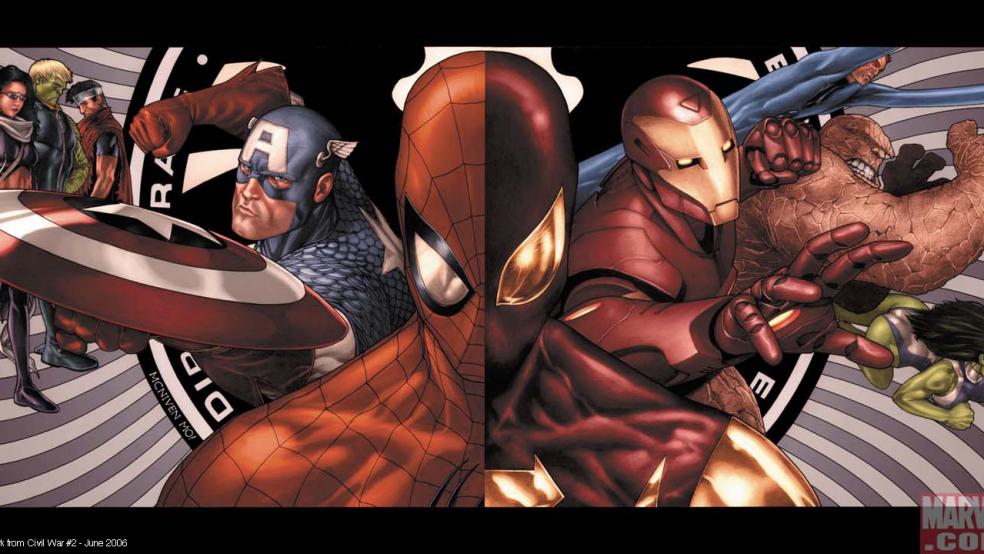This morning the Internet was all abuzz about a long-hoped-for reunion of a special kid from Queens with his longtime co-workers. After literally decades of negotiating and legal wrangling, Spider-Man will be joining The Avengers and the rest of the Marvel gang. The deal, struck between Sony, which owned the rights to Spider-Man, and Disney, which owns the rest of the Marvel Universe, is almost certain to raise literally billions of dollars for both companies.
Almost no one doubts the success of this deal, but the real questions are “How did this happen?” and “Why didn’t it happen sooner?”
Sam Raimi’s 2002 Spider-Man movie was almost single-handedly responsible for the emergence of the comic book film (Batman Begins, the other superhero tentpole franchise, didn’t arrive until 2005), but the tale of how the webslinger first made it to the silver screen is one of the more infamous stories of a property being stuck in Hollywood’s development hell.
Related: Hollywood’s Desperate Measures to Save the 2015 Season
Originally launched in 1985, long before even Tim Burton’s Batman, the Spider-Man series went through several bizarre scripts, including one in which Peter Parker literally became a homicidal spider and another incomprehensible script, from James Cameron, that was written to prevent the rights from expiring and was filled with violence, profanity and almost no relation to the characters fans know.
When the Raimi film was finally released, the end product was a breath of fresh air, managing to be light without being overly campy. It was true to the source material without being too dense for nonfans to follow. The age of the comic book movie had begun.
Following on that success, Marvel Studios had a string of hits, and then in 2009 was purchased by Disney, which has used the properties to make, among other things, the highest grossing movies of all time.
The one thing Disney couldn’t have was Marvel’s most iconic character. As the Marvel Universe expanded into movies, Sony held on tightly to the one piece of the pie it had. Unfortunately for Disney, this was the most important piece.
It might seem petty of Disney to want yet another superhero, when its lineup already boasts successful franchises like Iron Man, Captain America, Thor and now Guardians of the Galaxy (not to mention the Star Wars and Indiana Jones franchises, which are their own type of serialized entertainment). But in addition to being one of the main figures in the Marvel Universe, if not the main one, Spider-Man is also the most profitable comic book character in the world.
While DC’s Batman may have the cultural and critical cachet, he is, particularly in his current incarnation, a character for adults. Both Spider-Man and Batman fight crime due to personal family losses, but where Bruce Wayne is serious, troubled, brooding and almost psychotically violent, Peter Parker is a smart-ass kid from Woodside, Queens. Where Wayne has his billions, Parker is stuck still trying to make rent while also fending off threats to New York City and the world. Batman is serious. Spider-Man is fun.
Related: John Oliver’s HBO Show Returns to Take Us Down the Rabbit Hole
The appeal of the deal for both sides is obvious, both on a content level and a financial one. Sony had tried to keep Spidey, and his profit-making potential, to itself. Under the new partnership, it will still own and control the Spider-Man movies, and the most valuable character in the Marvel universe. But after the crash and burn of The Amazing Spider-Man 2, and given the studio’s embarrassing hacking mess, this deal could give the webslinger franchise some new life. Plus, Sony’s Amy Pascal, who has been in the news headlines for all the wrong reasons, will co-produce the next Spider-Man movie with the Marvel team led by Kevin Feige, cushioning the blow of losing her job as Sony Pictures chairwoman.
If the Sony collaborations are amazingly successful, Disney gets a piece of the box office. Marvel, meanwhile, gets to use Spider-Man in its shared universe films, including in the upcoming Captain America: Civil War, the comic book version of which features Spidey in a pivotal role. Both companies also can make lots more money in the form of movie-related merchandising — the various toys, video games and branded apparel that will sell by the truckload around any of the films.
Fans will not care that a different studio produced the standalone films, provided that it’s the same actor in the costume. And with Sony’s announcement that Andrew Garfield would not be returning to the role, the studio seems at long last to be owning up to its mistakes and seeing what it can learn from Marvel. It’s still up to them to not drop the ball on the finished product.
Top Reads from The Fiscal Times:



